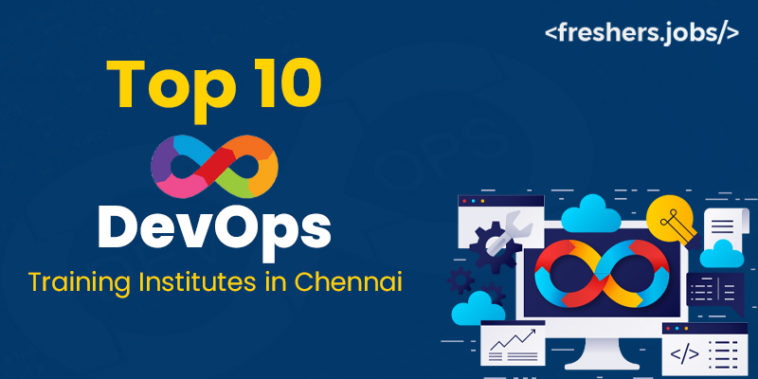Businesses are navigating an increasingly complex landscape where agility, efficiency, and collaboration are desirable and essential. As businesses aim to maintain a competitive edge in the market, integrating Development and Operations (DevOps) practices has emerged as a transformative force, reshaping how software is developed, delivered, and maintained. DevOps is not merely a set of tools or a methodology. It represents a cultural shift that promotes collaboration and communication between development and operations teams.

The goal is to break down traditional silos, fostering seamless and continuous integration of code deployment, infrastructure management, and application delivery. In this blog, we will delve into the key concepts of DevOps and how its adoption redefines the dynamics of the current business world. We will delve into the Top 10 DevOps Training Institutes in Chennai and DevOps role in the current business world, merits, components, and job opportunities in the current business world.
Listed below are the Top 10 Training Institutes in Chennai for Best DevOps Training in Chennai.
- FITA Academy
- Simplilearn
- Intellipaat
- Edureka
- Greens Technologys
- Besant Technologies
- Infycle Technologies
- ACTE
- Softlogic Systems
- Credo Systemz
1. FITA Academy
FITA Academy is a reputable training institute offering a comprehensive range of more than 120 courses, both available online and offline. Renowned for providing essential technical and professional certifications, the academy consistently ranks among the leading authorities in the industry. Boasting a team of more than 1,000 trainers with decades of experience, the institute has positively impacted the learning journeys of more than 75,000 individuals. The academy has established multiple branches in Bangalore, Pondicherry, Coimbatore, and Madurai, demonstrating its commitment to delivering top-tier training. This strategic expansion ensures that individuals across diverse regions have access to high-quality training opportunities.
Why DevOps Course in Chennai at FITA Academy?
FITA Academy delivers comprehensive DevOps Training in Chennai, covering foundational to advanced-level concepts. The curriculum encompasses a thorough understanding of DevOps principles, ecosystems, Linux, its versions, and commands. Additionally, participants will gain proficiency in Git, Jenkins, Ansible, Docker, Puppet, Nagios, and Kubernetes. The training includes hands-on experience with DevOps in the AWS Cloud, followed by engaging in live Capstone projects. Practical exercises are integrated into the curriculum to equip learners with the essential hands-on skills demanded in the contemporary workplace. Despite maintaining affordability, FITA Academy ensures a high-quality course accessible to a diverse audience. The institute offers flexibility in batch schedules, accommodating both weekend and weekday class options. Successful participants are eligible for placement support upon completing the training.
Customized Curriculum for DevOps Training in Chennai
The curriculum is meticulously designed to encompass the fundamental core principles of DevOps, providing in-depth coverage of essential topics. It initiates with an Introduction To DevOps, followed by comprehensive sections on Linux Administration and Source Control Using Git. Students acquire proficiency in Continuous Integration Using Jenkins. The curriculum further delves into advanced topics, including Ansible, Docker, Puppet, Nagios, and Kubernetes. Additionally, the program extends its exploration to the practical application of DevOps On AWS Cloud, ensuring a well-rounded understanding of key concepts.
Expert Trainers for the DevOps Course in Chennai
Participants will engage with highly skilled trainers possessing practical industry experience in FITA Academy’s DevOps Training in Chennai. These instructors are committed to delivering theoretical knowledge while sharing valuable real-world insights with students. Their role is pivotal in keeping learners abreast of the latest industry trends, ensuring comprehensive preparation for the dynamic field of DevOps.
Project Presentation Sessions in DevOps Course in Chennai
A distinctive feature of FITA Academy’s DevOps Course in Chennai is the integration of project presentation sessions. Acknowledging the significance of practical experience in mastering DevOps and preparing for a successful career, these sessions empower students to apply DevOps principles in real-world scenarios, providing invaluable hands-on exposure.
Complimentary Placement Sessions after DevOps Training in Chennai
FITA Academy is dedicated to offering extensive DevOps Training in Chennai that extends beyond traditional classroom learning. The institute equips students for the competitive job market through complimentary placement sessions. It covers crucial aspects such as resume building, interview skills, job placement assistance, and career guidance. These sessions are meticulously designed to support students in achieving their career objectives. With an expansive network of 1,500+ partner companies, FITA Academy facilitates job placements for graduates, presenting diverse opportunities within the DevOps industry. This extensive network ensures students have access to promising career prospects, facilitating a smooth and successful transition into the professional world.
2. Simplilearn
Simplilearn is a respected online platform offering a flexible DevOps Training Course that spans fundamental to advanced concepts. While the institute provides a comprehensive range of courses, the primary reliance on online learning may limit direct interaction between learners and trainers, accompanied by a higher cost.
3. IntelliPaat
Intellipaat specializes in DevOps training for both beginners and advanced learners. They present a curriculum enriched with valuable learning materials. However, their strong focus on online classes might impact direct interaction between instructors and students, and the course cost could be relatively higher compared to other institutes.
4. Edureka
Edureka delivers comprehensive DevOps training with real-time assistance. Despite offering extensive facilities, their primary emphasis on online courses might potentially affect direct interaction between trainers and aspirants.
5. Greens Technologys
Greens Technologys concentrates on providing DevOps Training to enhance skills and offers valuable industry knowledge. Nevertheless, it might not be the preferred choice for those seeking a more profound learning experience.
6. Besant Technologies
Besant Technologies specializes in DevOps Training tailored to industry-specific requirements. Besant Technologies offers a course where placement support might not be as comprehensive compared to some other institutes.
7. Infycle Technologies
Infycle Technologies offers an extensive DevOps course with essential skill development. They might not be the ideal choice for learners seeking a more extensive and in-depth learning experience.
8. Softlogic Systems
Softlogic Systems focuses on providing tailored DevOps Training for industry-specific needs. However, their practical training aspect may not be as comprehensive compared to other institutes.
9. ACTE
ACTE specializes in providing DevOps Training covering comprehensive concepts. They offer these benefits with the understanding that their level of placement support might be relatively less extensive compared to certain other institutes.
10. Credo Systemz
Credo Systemz offers DevOps courses with a focus on imparting essential skills. However, it’s crucial to note that their practical training component may not be as extensive as some other institutes.
Freshers Jobs meticulously selected these institutes after thorough research, considering factors such as brand reputation, student feedback, and a proven track record of student achievements.
Role of DevOps in the current Business World
The role of DevOps in the current business world is pivotal, serving as a transformative approach to software development and IT operations. DevOps, which stands for Development and Operations, is not merely a set of practices but a cultural shift emphasizing collaboration, communication, and integration between development and operations teams. DevOps is a key enabler for businesses aiming to stay competitive in the digital age. Its impact extends beyond the IT department, influencing organizational culture, collaboration models, and the overall ability to deliver value to customers consistently and efficiently. As businesses continue to embrace digital transformation, DevOps remains a cornerstone for success in the current business world.
What is DevOps?
DevOps is a set of practices, principles, and cultural philosophies that aim to improve and streamline the collaboration and communication between software development (Dev) and IT operations (Ops) teams. DevOps aims to create an environment where these traditionally siloed teams work together more effectively to deliver software applications and services rapidly, reliably, and at scale. Through the adoption of DevOps practices, organizations seek to attain various advantages, such as accelerated time-to-market, heightened deployment frequency, reduced failure rate in new releases, shortened lead time for fixes, and enhanced mean time to recovery. DevOps extends beyond mere tools; it constitutes a comprehensive approach that involves people, processes, and technology, working together to deliver software of superior quality with greater efficiency and collaboration.
Merits of DevOps
- Faster Time-to-Market: DevOps practices, like continuous integration and delivery, enable rapid and automated software deployment. This results in faster release cycles, allowing organizations to quickly bring new features and updates to market.
- Increased Deployment Frequency: DevOps promotes continuous deployment and automation, leading to increased deployment frequency. This means organizations can deliver smaller, incremental changes more frequently, reducing the risk associated with large and infrequent releases.
- Higher Quality Software: Automating testing processes and emphasizing continuous testing in DevOps lead to higher software quality. Identifying and addressing problems early in the development cycle ensures the software meets quality standards before production.
- Improved Collaboration: DevOps breaks down traditional silos between development and operations teams, fostering a collaborative culture. Enhanced communication and shared responsibilities lead to better understanding and cooperation between different organizational functional areas.
- Reduced Risk of Failures: Continuous monitoring and automated testing in the DevOps pipeline help identify and rectify issues before they reach production. This reduces the likelihood of defects and failures in the live environment, enhancing the overall reliability of software.
- Enhanced Efficiency through Automation: Automation is a cornerstone of DevOps, covering tasks such as code integration, testing, deployment, and infrastructure provisioning. Automation minimizes manual errors, accelerates processes, and allows teams to concentrate on more strategic and creative tasks.
- Scalability and Flexibility: DevOps practices, such as infrastructure as code (IaC), enable organizations to scale their infrastructure based on demand. This scalability ensures that applications can handle varying workloads, providing flexibility to adapt to changing requirements.
- Consistent and Repeatable Processes: Infrastructure as code and automation ensure that processes are consistent and repeatable. This mitigates the risk of configuration errors and ensures that deployments are reproducible, regardless of the environment.
- Continuous Feedback and Improvement: DevOps encourages continuous improvement by incorporating feedback loops throughout the development lifecycle. This iterative approach allows teams to learn from each release, making adjustments and enhancements for future iterations.
- Cost Optimization: Through automation and efficiency improvements, DevOps helps optimize costs. Reduced manual effort, faster time-to-market, and improved resource utilization contribute to better return on investment (ROI) for organizations.
- Improved Security Practices: DevOps incorporates security measures throughout the development lifecycle, promoting a DevSecOps approach. By addressing security concerns from the outset, organizations can reduce vulnerabilities and enhance the overall security posture of their applications.
- Employee Satisfaction: DevOps fosters a collaborative and innovative work culture, which can contribute to higher job satisfaction among team members. The emphasis on automation and streamlined processes also reduces mundane and repetitive tasks, allowing team members to focus on more engaging and challenging aspects of their roles.
Key Components of DevOps
Cultural Components
- Collaboration: DevOps emphasizes breaking down silos between development and operations teams. It encourages a collaborative culture where teams work together seamlessly, share responsibilities, and collectively focus on delivering value to the business.
- Communication: Effective communication is fundamental in DevOps. Teams must communicate openly and transparently to share information, address challenges, and ensure everyone is aligned toward common goals.
- Shared Responsibility: DevOps promotes a shift from individual team responsibilities to shared responsibilities across the entire development and operations lifecycle. This ensures that everyone is accountable for the success of the software delivery process.
- Continuous Learning: DevOps’s continuous learning and improvement culture is vital. Encouraging teams to experiment, derive lessons from failures, and consistently adapt processes is crucial for improving efficiency.
Process-related Components
- Continuous Integration (CI): CI regularly integrates code changes into a shared repository. Automated testing detects and addresses issues early in the development process, ensuring that the codebase is always reliable.
- Continuous Delivery (CD): CD extends CI by automating the whole software release process, from code integration to deployment. It ensures that software is consistently in a deployable state, ready for release at any time.
- Continuous Deployment: Continuous Deployment takes automation further by automatically deploying code changes to production after passing through the CI/CD pipeline. This approach minimizes manual interventions and accelerates the delivery of new features or fixes.
- Infrastructure as Code (IaC): IaC involves managing and provisioning infrastructure resources through machine-readable script files. It ensures consistent and repeatable infrastructure deployment, reducing configuration errors and enhancing scalability.
- Monitoring and Logging: Continuous monitoring of applications and infrastructure provides real-time insights into system performance. Logging and monitoring tools help identify issues promptly, allowing quick response and resolution.
Technical Components
- Version Control: Version control systems, like Git, enable teams to manage & track changes to the source code collaboratively. It ensures that changes are traceable, reversible, and seamlessly merged.
- Automation Tools: Various automation tools are used in DevOps, including configuration management tools (e.g., Ansible, Puppet), build tools (e.g., Maven, Gradle), and deployment tools (e.g., Jenkins, Travis CI).
- Containerization and Orchestration: Containerization tools like Docker enable packaging applications and their dependencies into containers for consistent deployment. Orchestration tools like Kubernetes manage and automate containerised applications’ deployment, scaling, and operation.
- Collaboration and Communication Tools: Tools like Slack, Microsoft Teams, or communication within integrated development environments (IDEs) facilitate real-time communication & collaboration among team members.
- Security Measures (DevSecOps): Security practices are integrated throughout the development lifecycle in a DevSecOps approach. Automated security testing, code analysis, and compliance checks help identify and address security issues early.
Career Opportunities in the DevOps field
- Junior DevOps Engineer: They are professionals who assist in implementing and maintaining CI/CD pipelines, supporting automation tasks, and collaborating with development and operations teams. They have skills like a Basic understanding of DevOps principles, familiarity with version control systems, and basic scripting skills.
- Release Coordinator: Their responsibility is to assist in coordinating and managing software releases, ensuring proper communication between teams, and supporting the deployment process. They have skills like Communication skills, attention to detail, and an understanding of release management processes.
- DevOps Engineer: They will design, implement, and manage CI/CD pipelines, automate infrastructure, and collaborate with cross-functional teams to improve development processes. They have skills such as proficiency in automation tools, experience with infrastructure as code, and strong collaboration and problem-solving skills.
- Site Reliability Engineer (SRE): They are professionals who focus on the reliability and performance of systems, automating operational tasks, and participating in incident response and post-mortems. They have skills like robust systems and infrastructure knowledge, scripting and programming skills, and experience in monitoring and observability.
- Senior DevOps Engineer: They will lead the design and implementation of DevOps practices, mentoring junior team members and contributing to strategic planning for development and operations. They have in-depth knowledge of automation tools, extensive experience with CI/CD, and strong leadership and communication skills.
- DevOps Architect: They are responsible for designing and implementing DevOps solutions for complex projects, overseeing architecture decisions, and providing guidance on best practices. They have deep expertise in DevOps technologies, architectural design skills, and the ability to lead and influence technical decisions.
- DevOps Manager: They lead and manage DevOps teams, oversee project delivery, and collaborate with other departments to align DevOps practices with organizational goals. They have Leadership and team management skills, strategic thinking, and the ability to align DevOps initiatives with business objectives.
- Director of DevOps: They are responsible for setting the strategic direction for DevOps initiatives, overseeing multiple teams, and ensuring alignment with the overall business strategy. They have strong leadership, strategic planning, and organizational management skills.
- Cloud DevOps Engineer: They specialize in implementing and managing DevOps practices in cloud environments, such as AWS, Azure, or Google Cloud. They have skills such as expertise in cloud platforms, infrastructure as code, and cloud-native technologies.
- Security DevOps Engineer (DevSecOps): Theta is responsible for integrating security practices into the DevOps pipeline, conducting security assessments, and ensuring compliance with security standards. Their skills include a profound grasp of security principles, familiarity with security tools, and the capability to implement security measures within the DevOps process.
As businesses navigate the intricate landscape of today’s competitive market, integrating DevOps practices stands out as a transformative force, reshaping the software development and delivery landscape. DevOps, beyond being a set of tools, signifies a cultural shift that encourages collaboration, communication, and the dissolution of traditional silos. This blog aims to delve into the crucial concepts of DevOps, exploring its role, merits, components, and job opportunities in the dynamic business world. Furthermore, we navigated the top 10 DevOps Training Institutes in Chennai.




